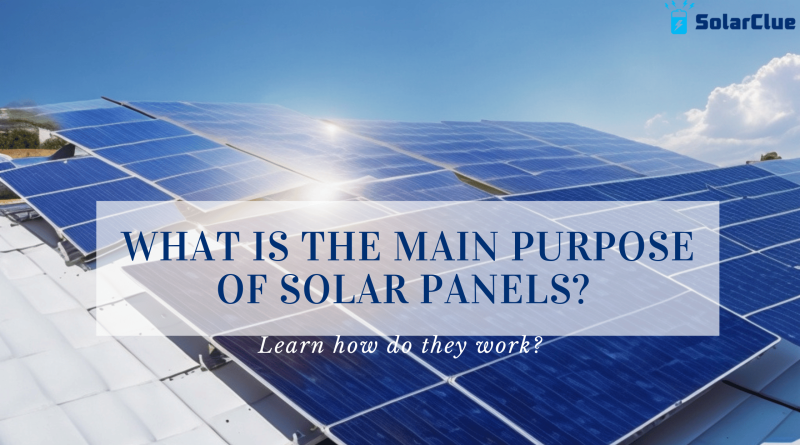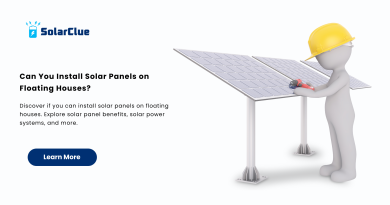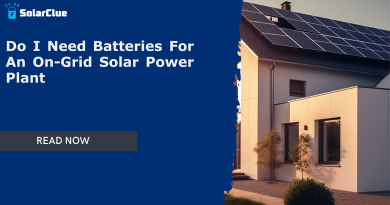What is the main purpose of Solar panels? How do they work?
In a world that badly needs clean energy options, solar panels have become a bright light. These simple devices can do something amazing: they can turn sunlight into electricity. This will change the way we power our homes, businesses, and even whole towns. This in-depth look will go over the main purpose of solar panels, the science behind how they work, and the huge impact they can have on making the future healthier and more sustainable for everyone.
Understanding the Goal: Giving Homes Solar Power
At their core, solar panels’ main job is to collect the sun’s endless energy and turn it into power that can be used. Sunlight, which is a powerful source of energy, can be used to power homes and businesses. This cuts down on our reliance on nonrenewable fossil fuels and lessens the damage that energy use does to the environment.
What are the amazing things about photovoltaic conversion that make solar panels work?
The Photovoltaic Effect: Breaking Down the Science
A process known as the photovoltaic effect makes solar cells work. Each panel is made up of many solar cells, which are generally made of silicon, which is a semiconductor. Sunlight excites the electrons in these cells, which makes them move and make an electric current. Then, an inverter can change this direct current (DC) energy into alternating current (AC), which is the type of electricity that homes and businesses use.
What Semiconductors Do: How They Turn Light into Electricity
Semiconductors are very important to this process. When sunshine, which is made up of very small particles called photons, hits the semiconductor material in a solar cell, it knocks electrons out of their atoms, which makes an electric current. By putting these cells together in panels and leaving them out in the sun, we can make a lot of energy.
The Effects on the Environment: Solar Panels as Earth’s Guardians
Solar panels are very good for the earth. Using the sun’s energy cuts our dependence on fossil fuels by a large amount, which lowers harmful greenhouse gas pollution. Moving towards clean energy sources is a very important thing that we need to do to stop climate change and protect our world for future generations. Solar panels are like silent guards that keep the environment safe and provide a sustainable energy solution that is both practical and moral.
This table shows how solar panels affect the environment and how important they are in fighting climate change, saving resources, promoting sustainability, and protecting natural areas.
| Environmental Aspect | Impact of Solar Panels |
| Cutting down on greenhouse gas emissions | Solar panels cut carbon pollution by a large amount, which helps fight climate change. |
| Taking care of natural resources | Solar energy lowers the need for chemical fuels, which are limited resources. |
| Getting people to use sustainable methods | Using solar power helps create a mindset of sustainability, which motivates others to do the same. |
| Keep ecosystems alive | Ecosystems are protected by solar panels because they cut down on waste. |
The Future of Solar Technology: New Ideas and Progress
As technology keeps getting better, the future of solar cells looks very bright. Innovative technologies like thin-film solar cells, which are small, light, and bendable, make it possible to use solar power in previously unimaginable places. Also, improvements in ways to store energy, like high-capacity batteries, make sure that there is a steady supply of power even at night or when it’s cloudy. Along with making solar panels more useful for a wider range of uses, these changes also make them easier to get and more efficient.
Finally, adopting solar power will lead to a better future.
In conclusion, solar panels are used for a lot more than just making power. They change the way we think about energy and provide a long-lasting, environmentally friendly option to traditional power sources. By learning the science behind how they work and realising how important they are for the environment, we can see solar panels not only as amazing pieces of technology but also as protectors of our planet. Renewable energy is becoming more and more important, and the history of solar panels shows how creative people can be and how committed we are to making the world better and more sustainable.
Use solar power to power your world
Are you ready to change things? It is time to use the sun’s power to help make the future more secure. The following are the things you need to know:
1. Consultation and Assessment: Talk to an expert at 088844 44830 on solar energy about setting up a meeting. Learn more about how solar panels can help your home or business.
2. Look into Your Credit Options: Find low-cost credit options that fit your needs. Solar systems are available to everyone because there are many ways to pay for them.
3. Professional Installation: Have the installation done by someone with a lot of experience. Make sure the setup goes smoothly, from checking out your home to connecting your system.
4. Get the word out: Tell your family, friends, and neighbours about solar energy. You can make renewable energy options have a bigger effect by getting the word out.
5. Monitor and Optimise: Check the performance of your solar panel system on a regular basis. Optimise how you use energy to save the most money and leave the least amount of damage on the earth.
You’re not only switching to solar power for yourself, but you’re also helping the world move towards green energy by taking these steps. Sunlight can power our world and show us the way to a better, cleaner tomorrow.
Solar panels convert sunlight into electricity, providing a clean and sustainable energy source.
Solar panels use photovoltaic cells to capture sunlight and convert it into direct current (DC) electricity.
Yes, solar panels can be installed on various types of homes, contributing to energy efficiency.
Solar panels reduce carbon emissions, air pollution, and reliance on non-renewable energy sources.
While they are most effective in direct sunlight, solar panels can still generate some power on cloudy days.
Solar panels typically have a lifespan of 25-30 years, with minimal maintenance requirements.
Sunlight intensity, panel orientation, and cleanliness impact solar panel efficiency.
Many countries offer incentives, tax credits, and rebates to encourage solar panel adoption.
Yes, rooftop solar panel installations are common and maximize exposure to sunlight.
Monitoring systems provide real-time data on energy production, helping users track their solar panel performance.





This insightful blog illuminates the fundamental purpose of solar panels giving power to homes and demystifies their workings. In clear and concise language, it delves into the transformative process of harnessing sunlight to generate clean energy. A must-read for those seeking a foundational understanding of solar technology and its pivotal role in sustainable energy solutions. Keep posting these kinds of informative blogs in the future!
Thank you so much for your appreciation.